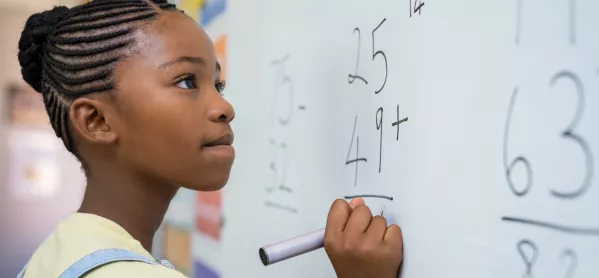England’s performance at primary maths has improved, according to the latest edition of a global education study, which places the country at number eight in the world.
However, the Trends in International Mathematics and Science Study of 64 countries also finds that England has slipped slightly in secondary maths.
Ten-year-old pupils in England scored 10 points higher in maths in Timss 2019 than those included in the 2015 study, results published today reveal.
The total score of 556 points in the study carried out by the International Association for the Evaluation of Educational Achievement (IEA), compared with 546 four years ago, meant England climbed up two positions in the rankings, from tenth to eighth.
It is immediately behind Northern Ireland and Russia, and on a par with Ireland.
Revealed: Timss 2019 - the top countries in science and maths
Timss 2015: At-a-glance tables
Related: Probe into countries’ responses to Covid school closure
Exclusive: Pirls global rankings are on, despite Covid
However, England’s 14-year-old maths performance decreased slightly, scoring 515 points compared with 518 in 2015.
Timss 2019: ‘Really impressive’ progress in maths
This meant England slipped two ranking positions, from 11th to 13th, on the same level as the US and ahead of Finland, which scored 509.
Dirk Hastedt, executive director of the IEA, which runs Timss, told Tes: “The mathematics results for England are very positive.”
He added that in the context of the 24 years covered by Timss, which started in 1995, England’s progress is “really impressive”.
He said: “If you look at the whole cycle of Timss, where England started in 1995, when the average achievement in grade four mathematics was about 484, now you have 556: that’s really impressive.”
However, Dr Hastedt said the study also flagged an eight-point gender gap between girls and boys aged 10 in maths in England.
“I think this is quite concerning and we really need to monitor this,” he said.
“I think it’s very important to look at teachers, especially female mathematics teachers, because they are role models for the girls in the classroom.”
On the 58 countries that completed the primary maths assessment last year, nine showed a new gender gap emerging among 10-year olds since 2015. In total, at that age, boys outperformed girls in maths in 27 countries.
Of the remaining countries, 27 did not show any gender gap, and girls did better than boys in four.
School standards minister Nick Gibb said: “This country’s continuing strong performance in maths, including the significant improvement in attainment among Year 5 pupils, is testament to the hard work of teachers and a reflection of the reforms we have put in place to raise standards and ensure our young people are receiving a truly world-class education.
“We know there is more to do, including continuing to improve the quality of science teaching and increasing the number of young people studying science subjects.”

